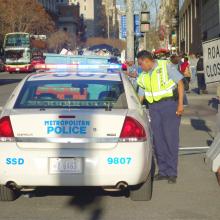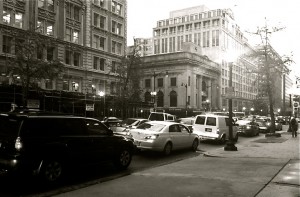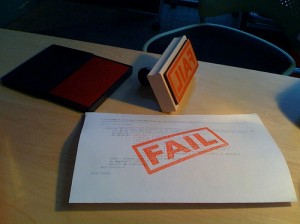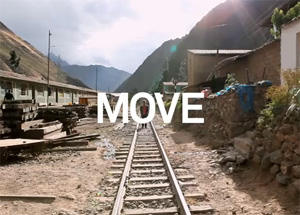D.C.

Image via ValeStock/Shutterstock.com
On Sept. 27, D.C. officials released video of Terrence Sterling’s final moments after being shot by a police officer on Sept. 11. Sterling was on his motorcycle when it struck the door of a police cruiser. Officer Brian Trainer shot him shortly afterward.

Image via Schmidt_Alex / Shutterstock.com
There has so far been no official accounting of what happened to Smith the morning of Nov. 1 on the second-floor landing of the Marbury Plaza Apartments in Southeast D.C. The Medical Examiner’s report tells part of the story, but there is still so much more unknown.
"I'm no longer stating that my son was beaten to death. My son was tortured to death. There are more injuries in the coroner’s report than I could visibly see with my eyes. There were injuries on my son’s back. He was hemorrhaging — the back. The back of his head was busted,” said mother Beverly Smith.
ON A TWO-ACRE parcel of land in Washington, D.C., tucked behind the provincial house of the Missionary Oblates of Mary Immaculate, Gail Taylor offers a visitor dragon’s lingerie.
“It kind of looks like fishnet stockings—that’s how it got the name,” Taylor says, holding up the heirloom snap bean, its pale yellow-green hull mottled with purple.
Across the aisle, Jack Be Little miniature pumpkins hide under leafy canopies. There are tomatoes and mustard greens, eggplant and legumes, lettuce and squash. “We’re doing a lot of intercropping and companion planting now,” Taylor says. So asparagus lies next to parsley, both behind a bed of raspberry bushes. Flowers also abound, with bursts of hot pink blossoms and purple clover that beautify the landscape while attracting pollinators.
For nearly 100 years this area, owned by the Oblates, a Catholic religious order, was only a grass field, a place where the priests would sometimes play soccer. In 2011, Taylor approached an Oblate priest and requested use of the land. “They were amenable and excited,” Taylor says. “They’re ecologically forward thinking, and they lead the Catholics in creation care.”
The space has become a location for Three Part Harmony Farm, the urban agricultural project Taylor established in D.C. She hopes it will become the first commercial farm in the District of Columbia since 1939, producing locally grown food to be sold in stores and farmers’ markets. First, there are some hurdles that the 36-year-old farmer must clear.
Photos depicting Gail Taylor's urban farming project at Three Part Harmony Farm
The District of Columbia has no voting representation in Congress, and our city government hasn't always been the best. But yesterday, D.C. Mayor Vincent Gray issued a new executive order reaffirming and strengthening previous policies that District police and other public agencies will not cooperate with Immigration and Customs Enforcement. Under the policy, D.C. police will not ask questions about the immigration status of someone arrested, and will not enforce ICE detainers against someone who has not committed another crime.

It took us a solid hour to travel six miles down New York Avenue, then another thirty minutes to get through the 3rd Street tunnel. The children were thirsty. More than once I considered turning around and heading home, though by that point it would have taken just as long to get home as to get where we were going.
And all along the way I rehearsed to myself the arguments of the Free Range Kids / Last Child in the Woods crowd. My husband and I like to think we have a mellow style of child rearing, more focused on moral development and kindness than in developing the "Super People" described in James Atlas' essay in the October 2 New York Times.
I was becoming the stereotype I decried -- schlepping children to lessons at the great cost of time and calm. Couldn't they just run around outside the house?
On the morning of September 11, 2001, I was at home in Washington, D.C. getting ready to go to Sojourners' office. I was upstairs listening to the news on NPR when I heard the first confusing report of a plane crashing into the south tower of the World Trade Center. I immediately called downstairs to Joy and asked her to turn on the television to see what was going on. Moments later, as we ate breakfast together with our three-year-old son Luke, we watched the second plane strike the north tower. I still remember my first response to Joy, "This is going to be bad, very bad," I said.
Of course, I meant more than just the damage to the Twin Towers and the lives lost, which became far greater than any of us imagined at first. Rather, my first and deepest concern was what something like this could do to our country and our nation's soul. I was afraid of how America would respond to a terrorist attack of this scope.
Rose Berger from Sojourners magazine spoke to the hundreds of us gathered in Lafayette Park just before we processed to the fence surrounding the White House. She mentioned the irony of building a monument to Dr. Martin Luther King, Jr. by the powerful political forces who disregarded or dismissed his message during his lifetime -- we only honor him after he is safely dead. How ironic also that the dedication of the monument was postponed by the most recent example of significant climate change. Will evidence of climate change begin to also signal political change?
Rose called on us to take up the banner of the Living Spirit of Dr. King within ourselves and allow it to inspire us as we risked arrest by calling on President Obama to take a clear stand to help protect our environment and begin to make a U-turn from the climate change path we are traveling as a nation and culture. We are part of a two-week vigil and civil disobedience action calling the president to deny permission for building the proposed Keystone XL Pipeline from the environmentally devastating tar sands/oil shale development in Alberta, Canada to refineries in Texas.
Broadcaster Tavis Smiley and Princeton professor Cornel West just wrapped up their 18-city "Poverty Tour." The aim of their trip, which traversed through Wisconsin, Detroit, Washington, D.C., and the Deep South was to "highlight the plight of the poor people of all races, colors, and creeds so they will not be forgotten, ignored, or rendered invisible." Although the trip has been met with a fair amount of criticism, the issue of poverty's invisibility in American media and politics is unmistakable. The community organizations working tirelessly to help America's poor deserve a great deal more attention than what is being given.
The main attack against the "Poverty Tour" is Smiley and West's criticism of Obama's weak efforts to tackle poverty. For me though, what I would have liked to see more is the collection of stories and experiences from the people West and Smiley met along their trip. The act of collective storytelling in and of itself can be an act of resistance.
If the United States is a fossil fuel addict, then the Alberta tar sands are our next big fix.
The tar sands contain the largest oil reserves in North America and their extraction has been called "the most destructive project on earth". The proposed Keystone XL Pipeline would carry oil from the tar sands down to Texas refineries, making it available for our consumption and pushing a turn to green energy sources even further down the road.
Borrowing wisdom from the twelve step program pioneered by Alcoholics Anonymous, theologian Ched Myers contends that addiction -- "the inability to say no because of captivity to pathological desires" -- names our spiritual and cultural condition. Perhaps nowhere is this clearer than in the case of fossil fuels.
When I first visited Ethiopia at the height of the 1984 famine, I watched as twenty-four people died of starvation in less than fifteen minutes, right in front of my eyes. Barely five years into my career as a Congressman, nothing my staff told me beforehand could have prepared me for what I saw on that trip.
Gasping at awful photographs of unspeakable human suffering is one thing; bearing firsthand witness to human suffering is another thing entirely. Glancing at a picture of a starving child in the newspaper, you can always turn away, but when you're staring into the eyes of a mother who has just lost that child, it's a completely different story. There's no looking the other way.
That's why I often describe those first Ethiopia experiences as my "converting ground" on issues of global hunger. What happened in Ethiopia changed me, and changed how an entire generation looks at hunger.
It's also why I'm currently back on the Horn of Africa, reporting on the ground from the Dadaab refugee camp in eastern Kenya, less than fifty miles from the Somali border. And I am appealing to my affluent brothers and sisters in the United Stated and around the world not to look away. We need your help.
Being a socialentrepreneur used to be a lonely endeavor. I grew up believing that to be in business meant leaving your soul at the front door -- being ruthless, shrewd, and above all focused on profitability at any cost. But as a businessman, I found myself less interested in the bottom line of profit than in the bottom line of community impact. For example, I started Busboys and Poets as a restaurant and gathering place, but also a social enterprise -- a business with a conscience -- in Washington, D.C.'s U Street neighborhood.
Having grown up in D.C., I was amazed at the dramatic changes that swept various neighborhoods in the 1990s. The U Street corridor in particular was undergoing some of the most vivid transformation.
Environmental activist Tim DeChristopher was sentenced recently to two years in prison and a $10,000 fine for disrupting a federal oil and gas lease auction in 2008 that was later deemed illegal. But don't cry for him. Having met the man, I can confidently say the last thing he wants is pity.
At a speaking engagement earlier this year, someone asked Tim how we could keep him from going to prison. He quickly responded, "I'm not sure keeping me out of prison is a good thing. I'd rather think about having you join me." After all, he didn't do it for himself.
 If you are a 12-year-old baseball player, it looks like a field of dreams. There are huge bleachers wrapped around home plate, and extending into left and right field. Behind home, there is a high official box where the game is announced, scores are kept, and reporters watch and write their stories. The field itself looks carefully tended with freshly cut green grass, and a flat-raked dirt infield without potholes, bumps, or ditches. And the beautiful grass of the outfield extends to actual fences, which each player hopes to reach as they gaze at the most perfect baseball diamond any of them have ever played on.
If you are a 12-year-old baseball player, it looks like a field of dreams. There are huge bleachers wrapped around home plate, and extending into left and right field. Behind home, there is a high official box where the game is announced, scores are kept, and reporters watch and write their stories. The field itself looks carefully tended with freshly cut green grass, and a flat-raked dirt infield without potholes, bumps, or ditches. And the beautiful grass of the outfield extends to actual fences, which each player hopes to reach as they gaze at the most perfect baseball diamond any of them have ever played on.

